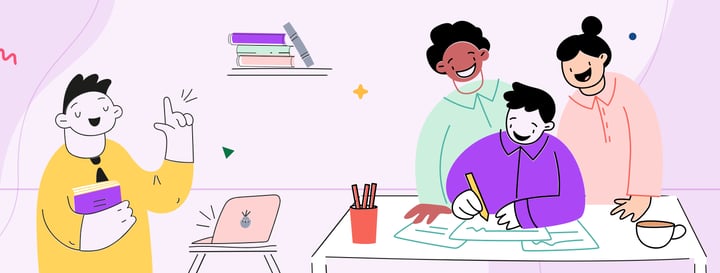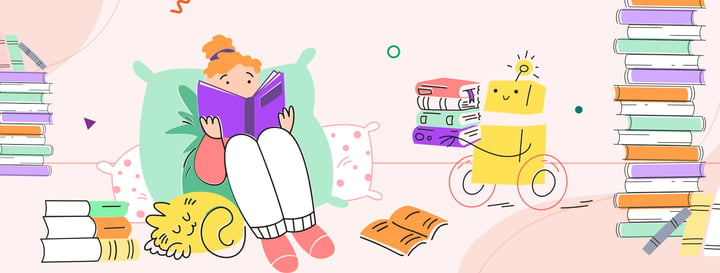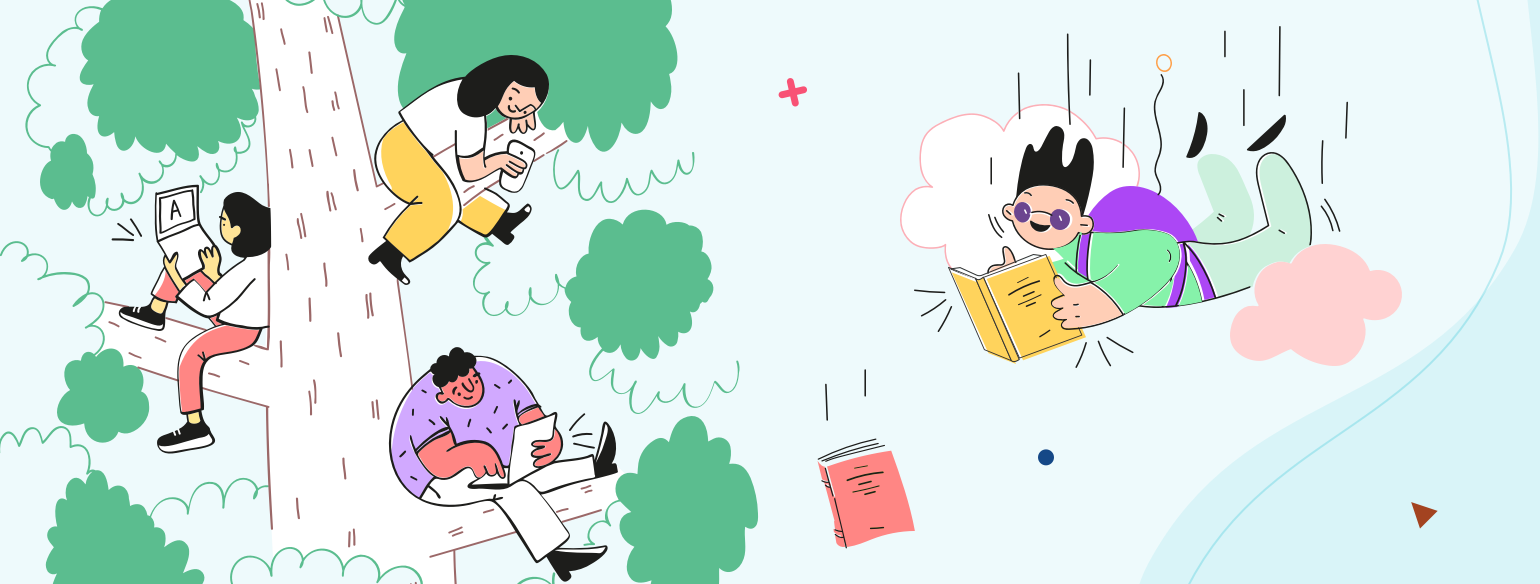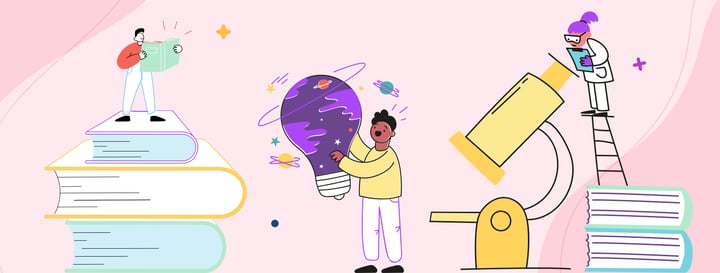Ah, the joys of losing ourselves in a great book. A paradise for adults and children alike! But did you know that reading can change and broaden our perspective on everyday life? It's been a topic on the minds of philosophers, educators, social scientists, and psychologists for centuries. Reading can be so much more than an enjoyable pastime. There are real benefits to reading, no matter what the literary genre. Let's look at some specific ways in which reading changes, expands, and enhances our perspective on life.
1. Expanding Your Imagination
Reading exposes us to a totally different world of new places and adventures that we may never experience firsthand. It stimulates the imagination when characters in a story turn into animals, travel far away in a spacecraft, or shrink to the size of an ant. The escapades of pirates in the 19th century or children surviving in a dystopian future make us wonder, “What would it be like?” or “How would I use my wits to get out of this awful situation?" A book doesn't need to be fantasy or sci-fi to expand the imagination. Through nonfiction books like memoirs and autobiographies, we can imagine what life would be like in different countries, time periods, and more. Stories are undoubtedly one of the most creative art forms in existence. As we read, we can absorb ideas and improve our own creative abilities.
2. Helping You Grow as a Person
Reading also gives us a different perspective by breaking down preconceived notions we might have about others. This helps to increase our understanding of the world around us and the people who live in it. The positive result is improvement in our own self-awareness and emotional intelligence. Social scientists and psychologists have done a great deal of research on how literature, particularly fiction, can impact aspects of our personality. Through enveloping ourselves in the experiences of different characters, we can relate to these experiences in our own daily lives. This helps us navigate through our own self-development journey and become better versions of ourselves.
Reading a life story about how a person overcame adversity can inspire us to do the same. When we learn about how others have dealt with poverty, tragedy, or a family crisis, it gives us the feeling that we can also manage the difficulties life throws at us. Stories of historical figures, such as George Washington or Marie Curie, teach us about how even these famous people made mistakes and worked through self-doubt. We get the opportunity to experience these other lives, to an extent, from a first-person perspective. Success for them did not come easily. It reminds us that no matter who we are, we'll have our own struggles and opportunities to move forward.
Books don't have to be about celebrities or some extraordinary person to touch us in a special way. Oftentimes, when we read about people who have similar disappointments (such as failing a test or not getting cast in the school play), we don't feel so alone. Such stories can help us find our own personal success and contentment.
3. Developing Empathy
Educators, authors, and psychologists often say that reading puts us in others’ shoes. Years of clinical research and formalized testing supports these claims. The Reading the Mind-in-the-Eyes test, for example, measures empathy and the ability to understand others who have different intentions and desires than our own. In these studies, researchers found that children who read fiction were more likely to help a stranger who had, say, dropped pens on the floor. In other words, they became better at practicing altruism.
The experience of becoming more attuned to the backgrounds, beliefs, and thought processes of different characters in books transfers to real life and can even extend to lifelong positive relationships. Studies have found that those who read more are better at sensing and interpreting the emotions of others, putting them in a position to help them (emotionally or otherwise) if needed.

4. Building Self-Confidence
Not only do our peers benefit from a great story through the practice of empathy, but we can benefit personally as well. Reading books is a great confidence-builder. Author and self-described introvert Susan Cain states that, because many writers are introverts, so are their protagonists. They have contemplative, cerebral, and intellectual personality traits. In fact, introverts often engage in reading because it is one of the few types of media that depict the depths of their emotions. Introverted characters are often endowed with special abilities, such as being magical, artistic, or highly intelligent. This is in major contrast to the more negative media stereotype of introverts as being aloof or dull.
Readers can also develop confidence and self-esteem by observing how the protagonist and other characters handle their hardships and challenges. As we share in the characters' journey of learning to accept and conquer their struggles, we get ideas (either consciously or subconsciously) about how we can do the same. We learn that we, too, can craft our own strategies to deal with the complex world around us.
5. Reducing Stress
Growing up is tough, especially as the chaos of global events has intensified over the last several years. It's no surprise that young people are feeling stressed out.
Studies show that childhood stress increases the risk of mental health disorders such as depression. Research also indicates that there are several long-term health effects, such as cardiovascular disease, diabetes, and even cancer, from early toxic stress. Reading both nonfiction and fiction can help reduce stress. This is because books tend to, at least temporarily, provide respite from personal issues. We can relax, calm our busy minds, and, in our own time, emerge with a sense of peace and tranquility.
Some feel that reading can decrease stress levels more effectively than listening to music or even going for a walk. This may be because, as we focus on the words in the book, muscle tension tends to decrease.

6. Exposing You to Different Points of View
When people pick their own reading material and immerse themselves in a story that interests them, they get to look at the world from a different lens. This adds a new perspective on different topics, places, times, cultures, and people. Through total engagement and immersion, the reader learns that the whole can be greater than the sum of its parts. Topics that are mere inconveniences in one situation may take on a totally different flavor in another. For example, a lack of water is much different for a family who is on a camping trip than it would be, say, for a family that is stuck in the middle of a refugee crisis. Through total engagement and immersion, readers can see a new side of an issue or situation and even overcome stereotypes or preconceived notions.
It's truly an amazing thing when we read a story that gives us insight into a completely different point of view. And nonfiction and fiction can both help broaden our worldviews. For example, students who struggle to engage with factual historical accounts, such as assigned reading about the Revolutionary War or the Civil Rights Movement, might find that fictional, historically based stories from the perspective of a single character sparks their interest more.
Helping young people understand how different points of view can entirely change the perspective of a story is an exciting prospect. Educators and other literary experts use several key terms to help students and readers of all ages understand different viewpoints through modes of narration. Check out this additional resource of reading worksheets to learn more about different points of view in literature.
7. Thinking More Analytically
Some research supports the view that reading (particularly artistic fiction such as poetry and fantasy) invites us to engage in a “conversation” with the characters in the story. By sharing experiences and emotions, a form of indirect communication occurs. Through these intimate conversations, we grow to understand why and how people feel the way they do. They allow us as readers to make inferences, or in other words, come to conclusions or judgments regarding what the author may be implying. The ability to make inferences is an extremely important component of advanced learning in all subjects, not just literature.
Another way that reading strengthens analytical thinking is by encouraging us to ask questions and ponder how the story is going to end. We are constantly kept on our toes as we speculate on who the killer or the kidnapper is or how the main character is going to conquer their fears.
...And One More Thing
It's predictable that reading contributes to improvements in vocabulary and writing. But it also makes perfect sense that involved readers tend to be more advanced in other academic areas, including STEM subjects (science, technology, engineering and math). These advantages create more opportunities in higher education, leadership, and earning potential.

Diving into a World of Books
A poignant quote by George RR Martin about reading says it all when it comes to changing our perspective:
“A reader lives a thousand lives before he dies. The man who never reads only lives once.”
With all the amazing gifts that the world of books gives us, don’t wait any longer to start reading—or to start reading more! At Beanstack, we strongly encourage everyone (that means children, adults, and also our elders) to jump full force into the joy of reading. Take every opportunity to read books online or visit your local bookstore and library.
If you're a library or school looking to drive reading engagement, contact our team today to learn how Beanstack can help.
Happy Reading!

